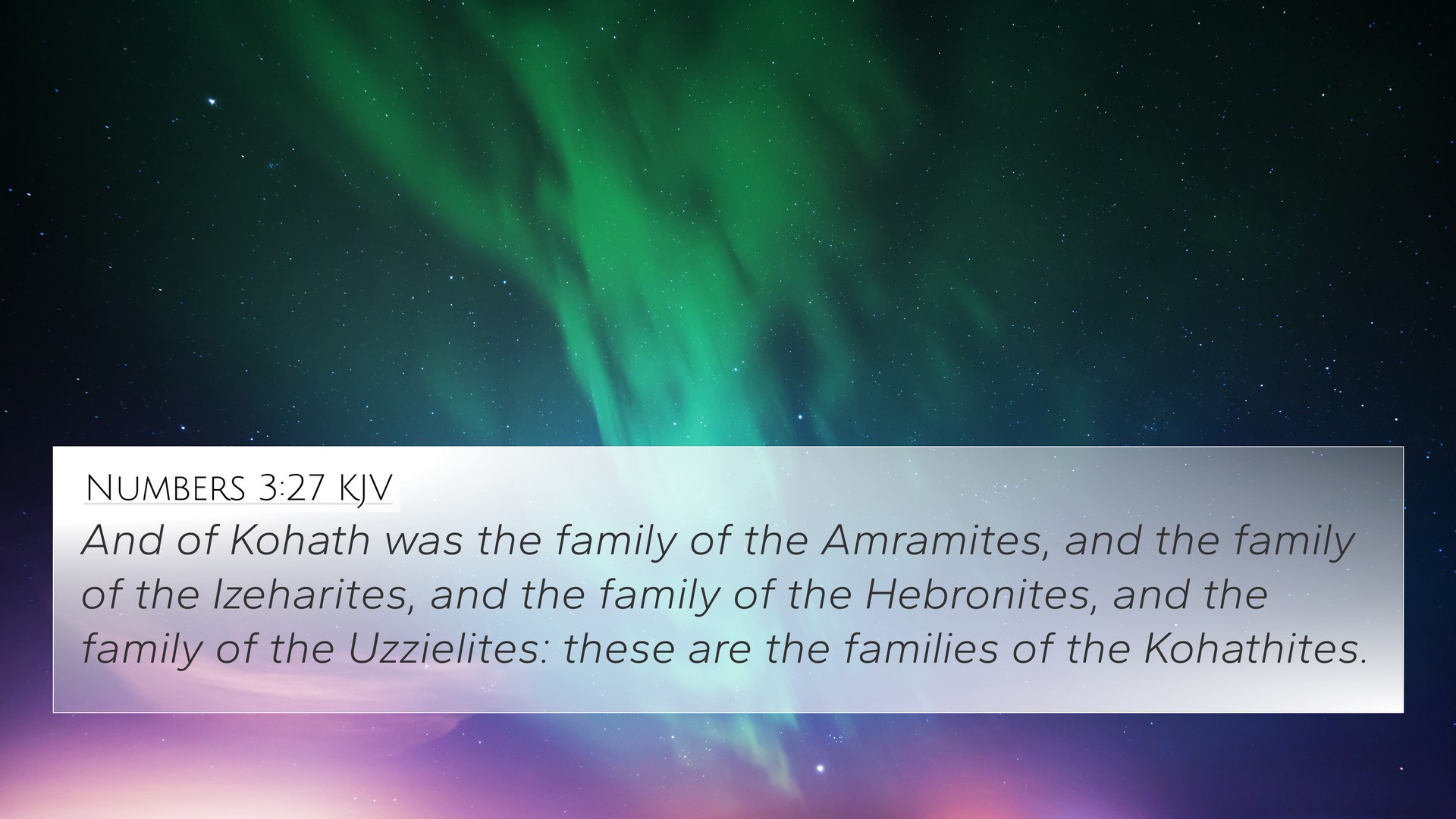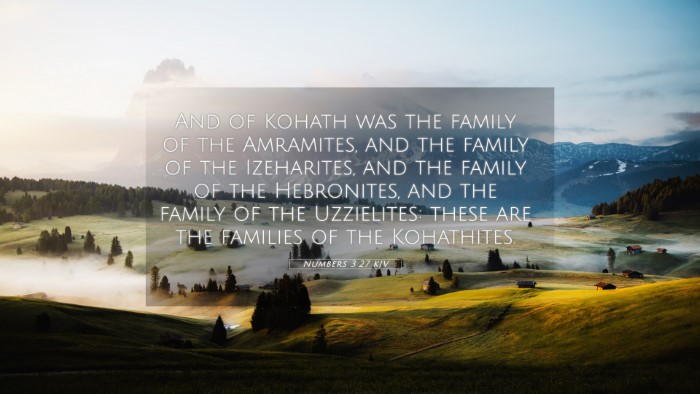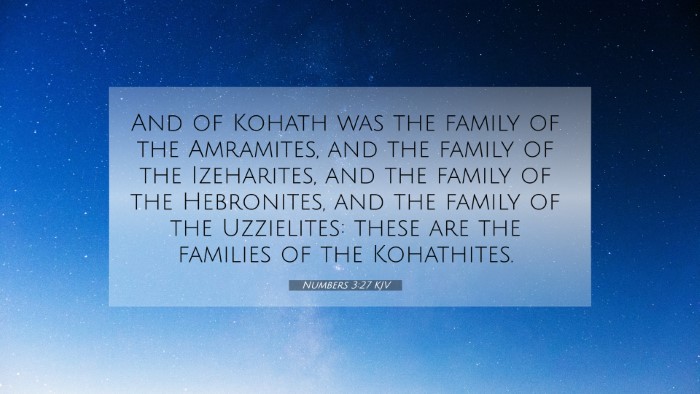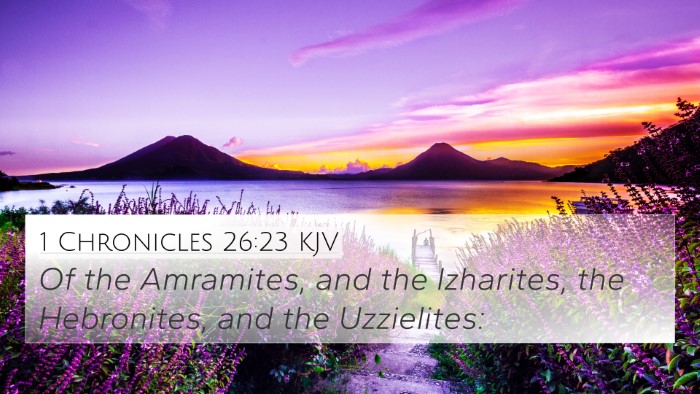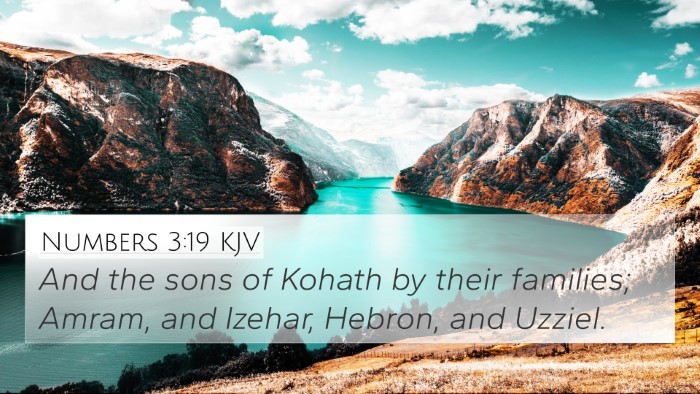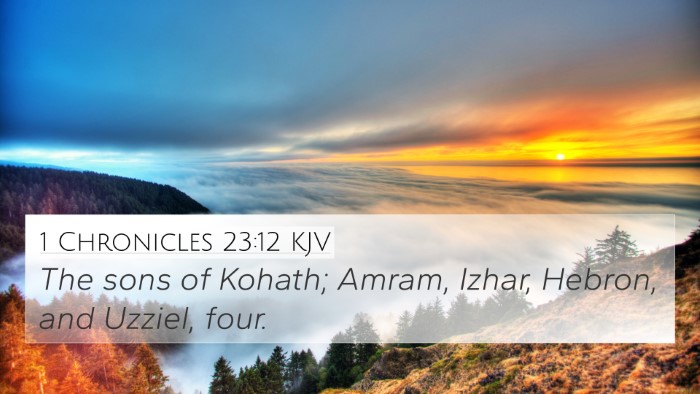Understanding Numbers 3:27
Numbers 3:27 states, "And of Kohath was the family of the Amramites, and the family of the Izharites, and the family of the Hebronites, and the family of the Uzzielites: these are the families of the Kohathites." This verse is part of the genealogical accounts within the book of Numbers, focusing on the lineage of the tribe of Levi, particularly the descendants of Kohath.
Summary of Meaning
This verse details the subdivisions of the Kohathites, one of the Levitical families tasked with specific roles in the service of the tabernacle. Understanding this genealogy helps in comprehending the organization and responsibilities of the Levites in relation to the worship practices of ancient Israel.
Commentary Insights
-
Matthew Henry:
Henry emphasizes that the division of families among the Levites, especially the Kohathites, signifies God’s order in worship. Each family had designated roles, reminding believers of the structure and honor owed to God in worship.
-
Albert Barnes:
Barnes notes that the families listed were trusted with the more sacred items of the tabernacle, highlighting the importance of the Kohathites in the overall service to God’s dwelling on earth. This reflects God's delegation of responsibility.
-
Adam Clarke:
Clarke points out that the identification of families reflects the continuity of God’s covenant with Levi, ensuring that His chosen lineage maintained its role within the community. Such genealogies reinforce the notion of divine selection and identity among the Israelites.
Cross-Referencing Biblical Texts
This verse connects with several other passages that elucidate various aspects of the Kohathites and their function. Here are 10 cross-references related to Numbers 3:27:
- Exodus 6:18-20: Establishes the genealogy of the Levites, including the family of Kohath.
- 1 Chronicles 6:1-15: Provides a more detailed genealogy of the Levites, tracing down to Aaron and the subsequent families.
- Numbers 4:1-20: Specifies the duties assigned to the Kohathites specifically regarding the tabernacle and its holy items.
- Exodus 40:18-33: Details the setting up of the Tabernacle, alluding to the roles of the Kohathites during the ceremonies.
- Hebrews 7:14: References the significance of the Levitical priesthood and its connection to Christ.
- Numbers 3:6-10: Describes the overall responsibilities of the Levites and the importance of Kohath's line within that structure.
- Genesis 49:5-7: Jacob's prophecy regarding Levi and the nature of his descendants serves as context for their roles.
- Psalm 78:68-72: Reflects on God’s choice of the tribe of Levi to lead His people in worship and service.
- 1 Peter 2:9: Offers a New Testament perspective on the royal priesthood, relating to the Levites' representative role before God.
- Exodus 28:1: Discusses the importance of Aaron and his sons' lineage within the Levitical framework.
Thematic Connections and Analysis
The role of the Kohathites exhibits a broader theme of service and sacrality in worship. Each division within the Levites served a distinct purpose, which can be compared to the structured ministry of the church today, emphasizing the significance of every role in the community of faith.
Moreover, understanding the connections between Bible verses like Numbers 3:27 and other genealogical accounts enriches our understanding of God's unfolding plan through history.
Tools for Bible Cross-Referencing
To further delve into these concepts, one may utilize Bible reference resources such as concordances and cross-reference guides that aid in identifying connections between biblical texts. How to find cross-references in the Bible typically involves examining verses alongside their contextual passages, often aided by study Bibles or software.
Conclusion
In conclusion, Numbers 3:27 not only provides a genealogical account but also serves as a gateway to understanding God’s careful orchestration in the worship practices of ancient Israel. Through the Kohathites and their obligations, one can trace the deep-seated idea of divinely appointed service that resonates throughout the entire biblical narrative.
